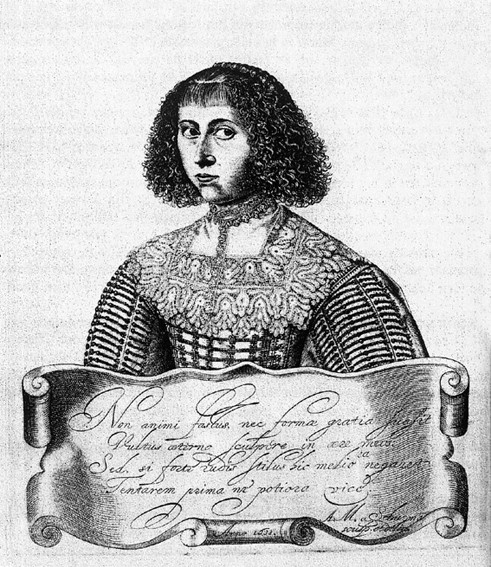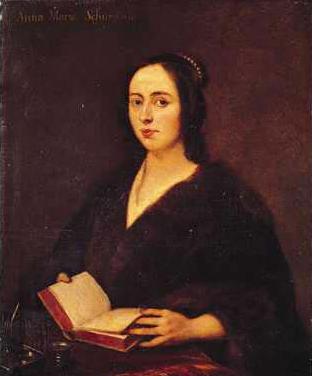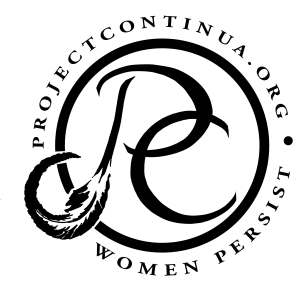- Self portrait, 1632
- Anna Maria van Schurman, 1649 by Jan Lievens
by Koren Whipp
Anna Maria van Schurman (1607–1678) Born in Cologne, Germany to father, Frederik van Schurman and mother, Eva von Harf, van Shurman lived most of her life in Utrecht, Holland, where she became renowned for her knowledge of theology, philosophy, medicine, and, at least 14 languages (Dutch, German, French, English, Italian, Latin, Greek, Hebrew, Aramaic, Arabic, Syriac, Samaritan, Persian, and Ethiopic).
Van Schurman was an artist, wrote poetry in German, Dutch, Latin, Greek, and Hebrew, and corresponded with many learned men and women of the Republic of Letters. She served as academic mentor to Princess Elizabeth of the Palatinate. She was a successful writer, and her Opuscula Hebraea Graeca Latina et Gallica, prosaica et metrica (Hebrew works of Greek and French, prose and meter) was published in 1648 and reprinted several times (1650, 1652, 1723, 1749). The Opuscula contains her logical defense of women’s right to study, the Dissertatio de ingenii muliebris ad doctrinam et meliores litteras aptitudine, translated into English as The Learned Maid.
Later in life she left the academy, the church, and the city of Utrecht to join the radical wandering Protestant, Jean de Labadie, founder of the Labadist Reformed movement. As a justification for her renunciation of study, she wrote a humanistic autobiography in Latin, the Eukleria. A surviving sample of her calligraphic writing, a page in several non-Roman scripts, is at the Royal Library in The Hague.
Sources
P. Van Beek, First Female Student: Anna Maria van Schurman (1636) Utrecht: Igitur, 2007.
Dr. Pieta van Beek Anna Maria Van Schurman http://www.annamariavanschurman.org/
Bibliography:
Bo, Karen Lee. “I Wish to be Nothing: The Role of Self-Denial in the Mystical Theology of A. M. van Schurman.” Women, Gender and Radical Religion in Early Modern Europe. Ed. Sylvia Brown. Leiden: 2008.
de Baar, Mirjam et al., eds. Choosing the Better Part. Anna Maria van Schurman (1607-1678). Dordrecht, Boston, London: Kluwer Academic Publishers, 1996.
Hays, Mary. Female biography, or Memoirs of illustrious and celebrated women of all ages and countries (6 volumes). London: R. Phillips, 1803.
Servaes, Brita. “Anna Maria van Schurman.” Mary Hays, Female Biography; or, Memoirs of Illustrious and Celebrated Women, of All Ages and Countries (1803). Chawton House Library Series: Women’s Memoirs, ed. Gina Luria Walker, Memoirs of Women Writers Part II. Pickering & Chatto: London, 2013: vol. X, pp.
van Beek, Pieta. First Female Student: Anna Maria van Schurman (1636). Utrecht: Igitur, 2007.
van Schurman, Anna Maria. Whether a Christian Woman Should Be Educated and Other Writings from Her Intellectual Circle. Ed. and trans. Joyce L. Irwin. The Other Voice in Early Modern Europe. Chicago: University of Chicago Press, 1998.
Wilson, Katharina M. and Frank J. Warnke, eds. Women Writers of the Seventeenth Century. Athens: U. of Georgia Press, 1989.
Resources:
Brooklyn Museum
Elizabeth A. Sackler Center for Feminist Art: The Dinner Party: Place Setting: Anna van Schurman
http://www.brooklynmuseum.org/eascfa/dinner_party/place_settings/anna_van_schurman.php
Page citation:
Koren Whipp. “Anna Maria van Schurman.” Project Continua (April 4, 2015): Ver. 1, [date accessed], http://www.projectcontinua.org/biographies/index/v_index/anna-maria-van-schurman/
Tags: Age of Discovery, Baroque, Calligraphers, Europe, Painters, Poets, Religious Thinkers, Translators


